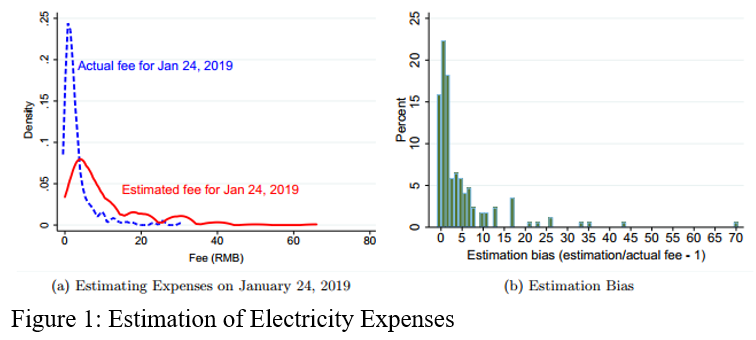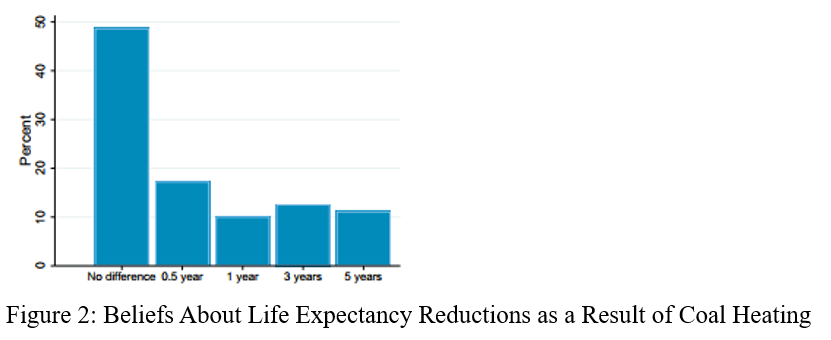“To Go Electric or to Burn Coal? A Randomized Field Experiment of Informational Nudges”
We conducted a randomized field experiment of informational nudges in northern China to investigate the potential obstacles that may hinder households from adopting cleaner heating, and evaluate the effectiveness of simple SMS nudges in encouraging the transition to electric heating. Our results show that the simple informational nudges have limitations and carry the potential for unintended consequences due to the salience bias, motivated belief, or participants’ aversion to perceived paternalistic interventions.

In many developing countries, coal heating remains a major source of indoor air pollution, which can lead to serious health issues and contribute to greenhouse gas emissions. In China, more than one-third of households continue to rely on coal-burning stoves for heating purposes (Duan et al. 2014, Barrington-Leigh et al. 2019). According to China’s Clean Winter Heating policy (2017–21), as of 2016, coal heating accounted for 31.6% of total heating in northern China, amounting to coal consumption of approximately 200 million tons each year. Despite the environmental and health appeals of electric heating, voluntary adoption of cleaner electric heating has been sluggish. Understanding the reasons behind households’ reluctance in transitioning to cleaner heating methods can provide valuable insights for the design of effective heating policies.
In our recent study (Fang, Li, and Shen 2023), we conducted a randomized field experiment of informational nudges in northern China to investigate the potential barriers that impede households from adopting cleaner heating and to assess the effectiveness of simple SMS nudges in promoting the switch to electric heating. We designed three specific SMS campaigns that target three potential behavioral biases: a Cost SMS campaign, designed to address the overestimation of electricity expenses; a Health SMS campaign, aimed at addressing the underestimation of health damage associated with coal heating; and a Social Comparison SMS campaign, intended to inform households about the popularity of electric heating if households are motivated by social comparisons.
The biases mentioned above can be seen as a result of imperfect information, and SMS interventions can potentially play a significant role in mitigating this imperfection, thereby assisting households in making more informed choices and enhancing overall welfare and efficiency. However, households may perceive the SMS campaigns as paternalistic (Allcott 2016, Glaeser 2006, Thaler and Sunstein 2003), and as a result, they may respond by making choices that go against the intended objective of the intervention.
Our study consisted of two stages. In the first stage, we conducted a pre-treatment survey with households that have both coal heating stoves and electric heating devices. The survey enabled us to gather information about households’ heating preferences, as well as factors that drive these preferences, and to elicit their estimates of the ongoing cost of electric heating and the health damage associated with coal heating. In the second stage, we randomly assigned households that participated in the pre-treatment survey into one of four treatment arms: Cost SMS, Health SMS, Social Comparison SMS, or a control group where no SMS was sent. Cost SMS provided households with their actual daily electricity expenses, and their weekly expenses on the last day of the SMS intervention. Health SMS provided scientific evidence of the various health issues related to coal heating. Social Comparison SMS provided information on the percentages of households in neighboring villages that had transitioned from coal-burning stoves to electric heating devices.
Figure 1 shows that a large proportion of households substantially overestimate their electricity expenses. Figure 2 shows that most households underestimate the health damage of coal heating: while the scientific evidence suggests that prolonged exposure to air pollution resulting from coal heating in the northern regions leads to a reduction in life expectancy by approximately 3 to 5.5 years (Chen et al. 2013, Ebenstein et al. 2017), most households believe that the reduction of life expectancy due to coal heating is minimal. Furthermore, we find that present-biased (Fang and Silverman 2009) participants were not more likely to prefer coal heating.


To analyze the households’ response to the SMS interventions, we use changes in electricity consumption as a proxy for changes in electric heating usage with individual households’ average daily electricity consumption in October as a baseline. We obtained household-level daily electricity consumption from the electric company for four weeks prior to the SMS intervention, and six weeks after the intervention. We use a standard difference-in-differences (DID) regression methodology to assess the treatment effects by comparing the electric heating consumption of individual households in the treatment groups with that of the control group before and after the SMS interventions.
For the impact of the SMS interventions, a formal DID analysis shows that, on average, none of the SMS campaigns has a significant positive effect on electric heating usage. The Cost SMS even has a statistically significant effect in reducing electric heating usage. Although the Cost SMS may correct the overestimation bias and thus increase electric heating usage, its backfire suggests an unintended salient bias as the SMS may increase attention to the cost aspect, making the cost more salient. It is also consistent with the notion that households may perceive the SMS negatively as a paternalistic intervention, and thus resist it as an external influence.
However, we also observe intriguing heterogeneous treatment effects. For the Cost SMS, while it has no significant effect on households who overestimate cost, it does lead to a reduction in electric heating usage for households that prioritize cost considerations. For the Health SMS, while it has no significant impact on households that underestimated the health damage of coal heating, it does have a significant positive effect on households that correctly understood the health damage of coal heating or considered health as an important factor in their heating choices. For the Social Comparison SMS, it has a significant positive effect on electric heating only among households that reported being concerned about their neighbors’ heating choices, which is only 12% of the study population.
While information nudges may appear to be cost-effective for promoting electric heating, our field experiment reveals their limitations and the potential for unintended consequences due to the salience bias, motivated belief, or participants’ aversion to paternalistic interventions. To design effective nudge interventions, it is crucial to take into account the heterogeneous beliefs and motivations of households prior to implementation. This entails accurately targeting the interventions to specific groups that are more receptive to them while avoiding groups that may resist or counteract the interventions.
(Hanming Fang, Department of Economics, University of Pennsylvania; King King Li, Shenzhen Audencia Financial Technology Institute, Shenzhen University; Peiyao Shen, School of Economics, University of Queensland)
References
Allcott, Hunt. 2016. “Paternalism and Energy Efficiency: An Overview.” Annual Review of Economics (8): 145–76. https://doi.org/10.1146/annurev-economics-080315-015255.
Barrington-Leigh, Christopher, Jill Baumgartner, Ellison Carter, Brian E Robinson, Shu Tao, and Yuanxun Zhang. 2019. “An Evaluation of Air Quality, Home Heating, and Well-Being under Beijing’s Programme to Eliminate Household Coal Use.” Nature Energy 4, 416–23. https://doi.org/10.1038/s41560-019-0386-2.
Chen, Yuyu, Avraham Ebenstein, Michael Greenstone, and Hongbin Li. 2013. “Evidence on the Impact of Sustained Exposure to Air Pollution on Life Expectancy from China’s Huai River Policy.” Proceeding of the National Academy of Sciences 110 (32): 12936–41. https://doi.org/10.1073/pnas.1300018110.
Duan, Xiaoli, Yong Jiang, Beibei Wang, Xiuge Zhao, Guofeng Shen, Suzhen Cao, Nan Huang, Yan Qian, Yiting Chen, and Limin Wang. 2014. “Household Fuel Use for Cooking and Heating in China: Results from the First Chinese Environmental Exposure-Related Human Activity Patterns Survey (CEERHAPS).” Applied Energy 136: 692–703. https://doi.org/10.1016/j.apenergy.2014.09.066.
Ebenstein, Avraham, Maoyong Fan, Michael Greenstone, Guojun He, and Maigeng Zhou. 2017. “New Evidence on the Impact of Sustained Exposure to Air Pollution on Life Expectancy from China’s Huai River Policy.” Proceeding of the National Academy of Sciences 114 (39): 10384–89. https://doi.org/10.1073/pnas.1616784114.
Fang, Hanming, King King Li, and Peiyao Shen. 2023. “To Go Electric or to Burn Coal? A Randomized Field Experiment of Informational Nudges.” NBER Working Paper No. 31841. https://www.nber.org/papers/w31841.
Fang, Hanming, and Dan Silverman. 2009. “Time-Inconsistency and Welfare Program Participation: Evidence from the NLSY.” International Economic Review 50 (4): 1043–77. https://doi.org/10.1111/j.1468-2354.2009.00559.x.
Glaeser, Edward L. 2006. “Paternalism and Psychology.” University of Chicago Law Review 73 (1), article 8. https://chicagounbound.uchicago.edu/uclrev/vol73/iss1/8.
Thaler, Richard H., and Cass R. Sunstein. 2003. “Libertarian Paternalism.” American Economic Review 93 (2): 175–79. https://doi.org/10.1257/000282803321947001.

Latest
Most Popular
- VoxChina Covid-19 Forum (Second Edition): China’s Post-Lockdown Economic Recovery VoxChina, Apr 18, 2020
- China’s Great Housing Boom Kaiji Chen, Yi Wen, Oct 11, 2017
- China’s Joint Venture Policy and the International Transfer of Technology Kun Jiang, Wolfgang Keller, Larry D. Qiu, William Ridley, Feb 06, 2019
- The Dark Side of the Chinese Fiscal Stimulus: Evidence from Local Government Debt Yi Huang, Marco Pagano, Ugo Panizza, Jun 28, 2017
- Wealth Redistribution in the Chinese Stock Market: the Role of Bubbles and Crashes Li An, Jiangze Bian, Dong Lou, Donghui Shi, Jul 01, 2020
- What Is Special about China’s Housing Boom? Edward L. Glaeser, Wei Huang, Yueran Ma, Andrei Shleifer, Jun 20, 2017
- Evaluating Risk across Chinese Housing Markets Yongheng Deng, Joseph Gyourko, Jing Wu, Aug 02, 2017
- Privatization and Productivity in China Yuyu Chen, Mitsuru Igami, Masayuki Sawada, Mo Xiao, Jan 31, 2018
- How did China Move Up the Global Value Chains? Hiau Looi Kee, Heiwai Tang, Aug 30, 2017
- China’s Shadow Banking Sector: Wealth Management Products and Issuing Banks Viral V. Acharya, Jun Qian, Zhishu Yang, Aug 09, 2017




 Facebook
Facebook  Twitter
Twitter  Instagram
Instagram WeChat
WeChat  Email
Email 


